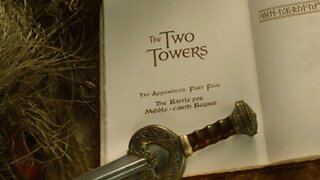Premium Only Content

The Cherry Orchard by Chekhov | Ashcroft, Gielgud, Tutin, Holm, Dench (RSC 1962)
A 1962 The Royal Shakespeare Company/BBC Television version of Anton Chekhov's "The Cherry Orchard", translated by John Gielgud and directed by Michael Elliott from Michel Saint-Denis stage production. It features Peggy Ashcroft as Ranevskaya, John Gielgud as Gayev, Dorothy Tutin as Varya, Ian Holm as Trofimov, Judi Dench as Anya, and Patsy Byrne as Dunyasha.
Set in fin-de-siecle Russia, this adaptations of Anton Chekhov's famous play chronicles a noblewoman's return to her family estate after a five-year absence. She finds that the family fortune has dwindled to practically nothing, and that she and her brother are faced with the difficult choice of selling the family's treasured cherry orchard or losing everything. In denial, she continues living in the past, deluding herself and her family, while the beautiful cherry trees are being axed down by the re-possessor Yermolai Alexeyevich Lopahin (George Murcell), her former serf, who has his own agenda.
The Cherry Orchard is the last play by Russian playwright Anton Chekhov. Written in 1903, it was first published by Znaniye (Book Two, 1904), and came out as a separate edition later that year in Saint Petersburg, via A.F. Marks Publishers. On 17 January 1904, it opened at the Moscow Art Theatre in a production directed by Konstantin Stanislavski. Chekhov described the play as a comedy, with some elements of farce, though Stanislavski treated it as a tragedy. Since its first production, directors have contended with its dual nature. It is often identified as one of the three or four outstanding plays by Chekhov, along with The Seagull, Three Sisters, and Uncle Vanya.
The story presents themes of cultural futility – both the futile attempts of the aristocracy to maintain its status and of the bourgeoisie to find meaning in its new-found materialism. It dramatizes the socioeconomic forces in Russia at the turn of the 20th century, including the rise of the middle class after the abolition of serfdom in the mid-19th century and the decline of the power of the aristocracy.
Widely regarded as a classic of 20th-century theatre, the play has been translated and adapted into many languages and produced around the world. It has influenced many other playwrights, including Eugene O'Neill, George Bernard Shaw, David Mamet, and Arthur Miller.
-
 21:59
21:59
Adaneth - Cinema&TV
22 hours agoLOTR: The Two Towers | Editorial: Refining the Story (Part 4-Doc 1 - ITA SUB)
12 -
 LIVE
LIVE
FyrBorne
20 hours ago🔴Warzone M&K Sniping: Warzone's Heavy Hitters
7,304 watching -
 20:16
20:16
DeVory Darkins
10 hours ago $2.39 earnedTulsi Gabbard shocking update regarding russia hoax against President Trump
7.6K41 -
 2:04:33
2:04:33
"What Is Money?" Show
18 hours agoThe Dollar is Rotten: A Winemakers Journey to Bitcoin w/ Ben Justman
17.2K6 -
 5:30
5:30
Michael Knowles
18 hours agoCBS Cancels Stephen Colbert’s Late Show
31.5K36 -
 11:49
11:49
Nikko Ortiz
17 hours agoCrazy Instant Karma Clips
22.8K17 -
 LIVE
LIVE
MrR4ger
2 hours agoSOLO DOLO QUESTING - ESCAPE FROM TARKOV PVE IS FUN??? *NEW R4GER RIFFS MONDAY!!**
151 watching -
 LIVE
LIVE
Anvilight
5 hours agoWorld of Warcraft | Returning to Scotland AND Azeroth! | Scotsman Unites The American Clans
84 watching -
 16:21
16:21
Actual Justice Warrior
23 hours agoSuper Mayor Replacement SCAMS Voters
24K15 -
 LIVE
LIVE
Sacred Sage
3 hours ago $0.06 earnedClair Obscur: Expedition 33: How MASSIVE Is This Map?!
95 watching